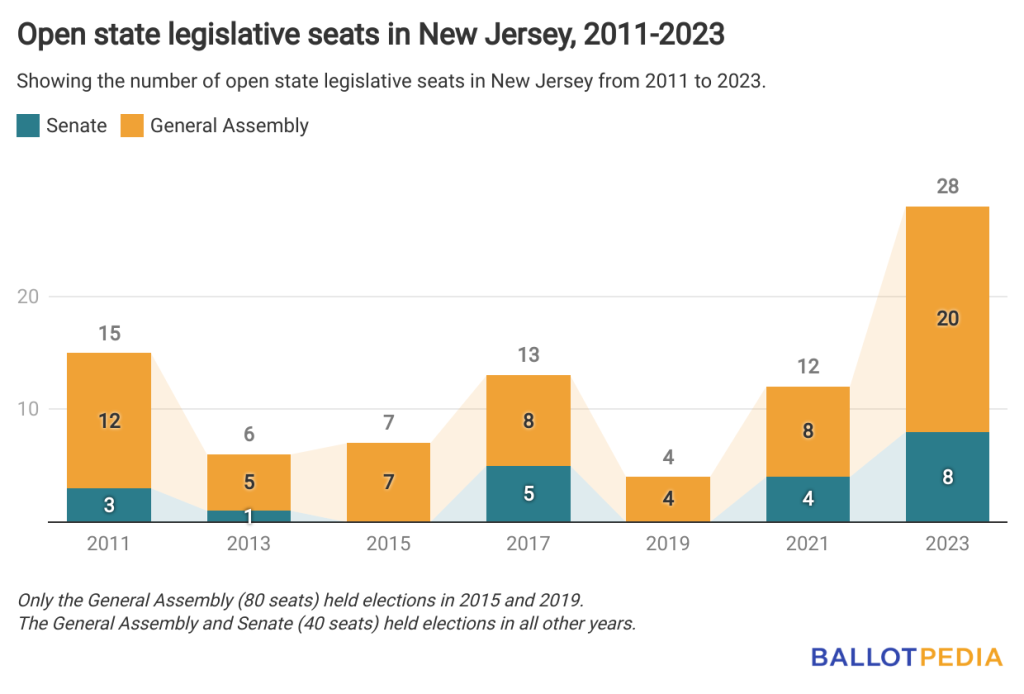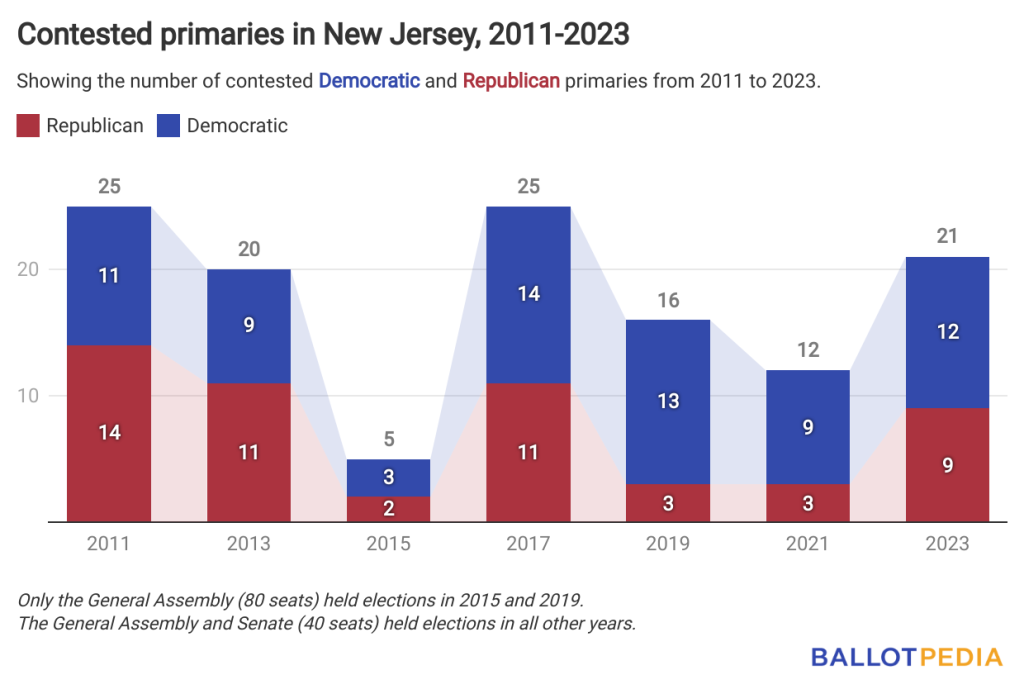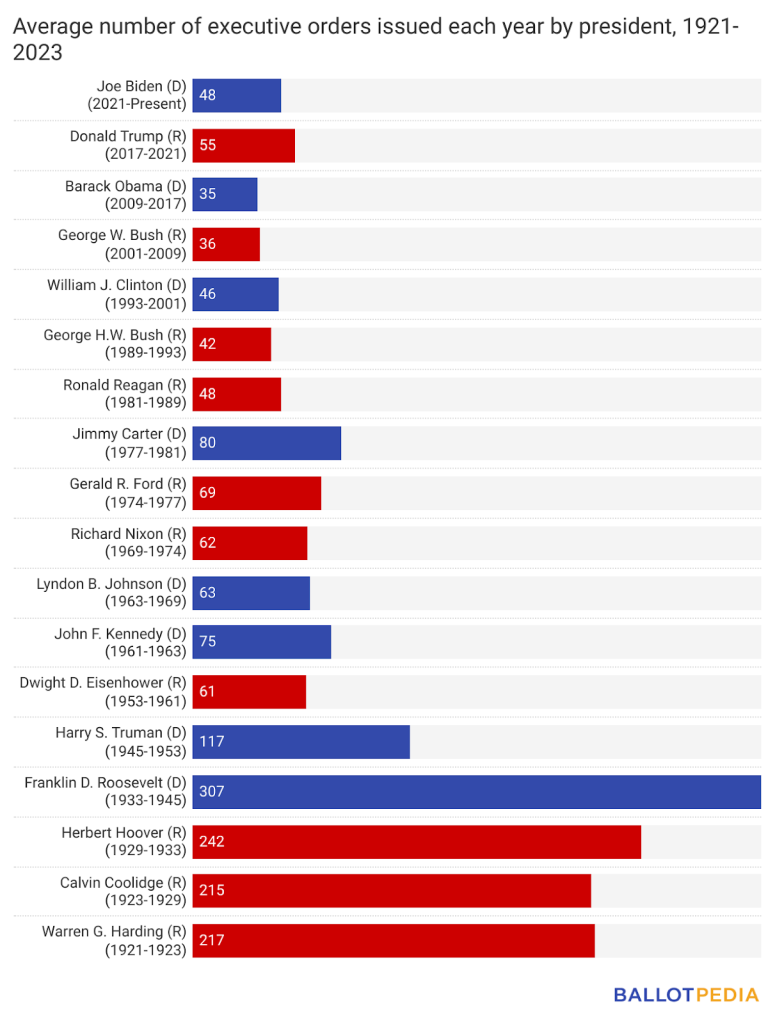Welcome to the Monday, June 5, Brew.
Here’s what’s in store for you as you start your day:
- A preview of tomorrow’s New Jersey statewide primaries
- Biden issued two executive orders in May on sanctions and coronavirus vaccine requirements
- States continue to enact more election-related legislation this year than in 2022
A preview of tomorrow’s New Jersey statewide primaries
Tomorrow is Tuesday, and that means it’s Election Day somewhere. This week, that somewhere is New Jersey.
The Garden State is holding municipal and state legislative primaries tomorrow. The state is one of four, along with Louisiana, Mississippi, and Virginia, holding state legislative elections this year. Tomorrow’s primary is the first state legislative primary date of the 2023 election cycle.
Here’s what you need to know.
State legislative districts
The 28 open seats this year are the most in a decade, with eight open in the Senate and 20 in the General Assembly. There were 12 open seats in 2021 and 13 in 2017, when the entire Legislature was up for election.
All 120 seats in the state legislature are up for election this year: 40 in the Senate and 80 in the General Assembly.

This is New Jersey’s first election under new state legislative maps following the 2020 redistricting, The number of open seats tends to rise following redistricting.
Some incumbents may opt against running for re-election because the partisan makeup has changed. Others may not run because they now live in a district with another incumbent.
This year, 27 incumbents are retiring, 20 in the General Assembly and seven in the Senate.
Seventeen incumbents face contested primaries this year. There were 10 such primaries in 2021 and 25 in 2019.
Overall, 21 primaries—12 Democratic and nine Republican—are contested. That’s the most since 2017, when 25 primaries were contested.

Three incumbents are running in new districts this year:
- In the Senate, Sen. Nia Gill (D) is leaving her District 34 seat open to run in District 27. Gill will face the district’s incumbent, Sen. Richard Codey (D), in a Democratic primary.
- In the General Assembly, Assms. Brian Bergen (R) and Christian Barranco (R) are switching districts. Bergen is moving from District 25 to District 26, and vice versa for Barranco.
Democrats currently have a 45-34 majority in the General Assembly, with one vacancy, and a 25-15 majority in the Senate. Governor Phil Murphy is a Democrat, making the state a Democratic trifecta.
New Jersey Assembly members serve two-year terms, with all seats up for election every two years. New Jersey Senators serve four-year terms, except in the first term of a new decade (like the current one), which only lasts for two years.
New Jersey’s General Assembly and Senate are two of eight state legislative chambers up for election this year. There are 99 chambers throughout the country.
Municipal elections
Essex and Hudson counties—where Newark and Jersey City, respectively, are located—are holding primaries for their board of commissioners. All nine board seats are up for election in each county.
Essex County is also holding primaries for county surrogate—a probate judge with jurisdiction over the handling of wills and other estate matters. Incumbent Alturrick Kenney, in office since 2019, is the only candidate running in the Democratic primary. Peter Russo is the only candidate running in the Republican race.
The office of county executive is also on the ballot in Hudson County. Eleana Little and Craig Guy are running in the Democratic primary. There are no candidates on the ballot in the Republican primary. Incumbent Thomas Degise (D), in office since 2002, is not running for re-election.
What else should I know?
New Jersey conducts semi-closed primaries, meaning a voter generally must be registered as a party member in order to participate in that party’s primary. An unaffiliated voter can participate in a party’s primary if they affiliate with a party on the day of the election. Otherwise, voters must indicate their party preference (e.g., via an updated voter registration) no later than the 55th day preceding the primary.
Winners in New Jersey primaries are determined via plurality vote, meaning that the candidate with the most votes wins even if they did not win more than 50 percent of votes cast. There are no runoffs.
The general election for all the seats up for election tomorrow is Nov. 7.
Biden issued two executive orders in May on sanctions and coronavirus vaccine requirements
President Joe Biden (D) issued two executive orders in May, bringing his total to 115. That’s more than the number of executive orders the three previous presidents had issued at this point in time. President Donald Trump (R) had issued 109 executive orders at this point, President Barack Obama (D) had issued 86, and President George W. Bush (R) had issued 110.
The two orders he issued last month were:
- Executive Order on Moving Beyond COVID-19 Vaccination Requirements for Federal Workers (May 9, 2023)
- Executive Order on Imposing Sanctions on Certain Persons Destabilizing Sudan and Undermining the Goal of a Democratic Transition (May 4, 2023)
Biden issued 25 executive orders in January 2021, more than any other month of his presidency. He did not issue any executive orders in November 2022 and January 2023.
Biden is averaging 48 executive orders per year, tied with Ronald Reagan (R) for the second-most among presidents since 1981. Donald Trump (R) averaged 55 executive orders per year, the most in that time. Barack Obama (D) averaged 35 per year, the fewest in that time. Presidents over the last 40 years have issued an average of 40 executive orders per year.

Franklin D. Roosevelt (D) issued an average of 307 executive orders per year, the most of all U.S. presidents. William Henry Harrison (Whig) averaged the fewest, issuing none during his one month in office. Three presidents issued only one executive order each: James Madison (Democratic-Republican), James Monroe (Democratic-Republican), and John Adams (Federalist).
States continue to enact more election-related legislation this year than in 2022
As of June 1, legislators across the country have enacted 174 election-related bills this year, 32 more than the 142 bills states had enacted at this point in 2022.
Tennessee has enacted the most bills this year (17). In 2022, New York and California had enacted the most bills at this point.
Of this year’s 174 enacted bills, Republicans sponsored 106, or 63%, up from 54% of the total enacted at this point last year. Democrats sponsored 16%, down from 18% in 2022. Bills with bipartisan sponsorship make up 12% of the total enacted, down from 18% last year. Those with unclear partisan sponsorship are up to 10% from 9% in 2022. To see all bills approved this year, click here.

This past week, state legislators enacted five new election-related bills, including:
- House Bill 05004, in Connecticut, which implements early voting in the state.
- Senate Bill 2258, in Texas, which authorizes certain cities to change the date on which their general election for officers is held.
- House Bill 0508, in Vermont, which establishes that the City of Burlington will use ranked choice voting to elect the offices of mayor, city council, school commissioner, and ward election officer.
In addition to these five newly-enacted bills, 47 other bills passed one chamber this week, moving on to the next. No bills passed both chambers of a state legislature this week.
You can view a full list of enacted bills this year here.
To stay up-to-date with the latest news in election-related legislation, subscribe to The Ballot Bulletin, our weekly newsletter—dropping every Friday afternoon—that delivers the latest updates on election policy. Every week, we track legislative activity, big-picture trends, recent news, and in-depth data from our Election Administration Legislation Tracker.
Learn More






